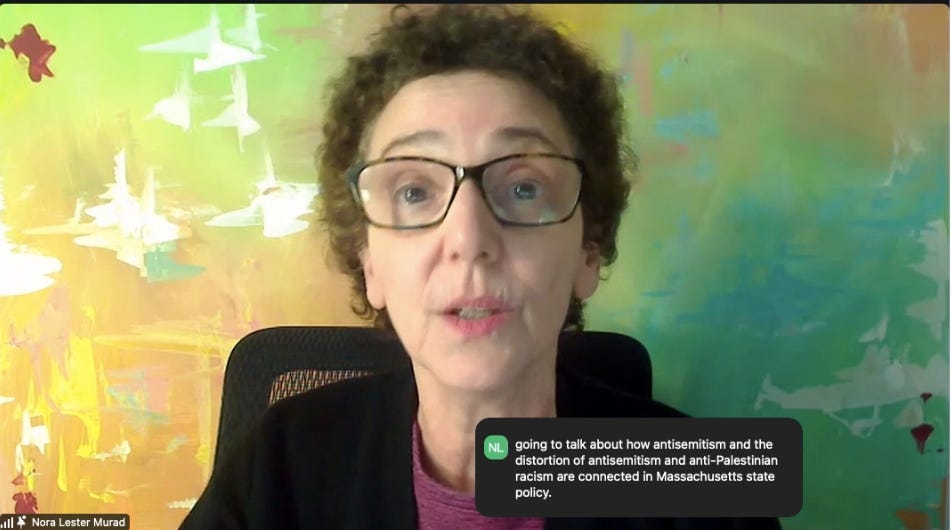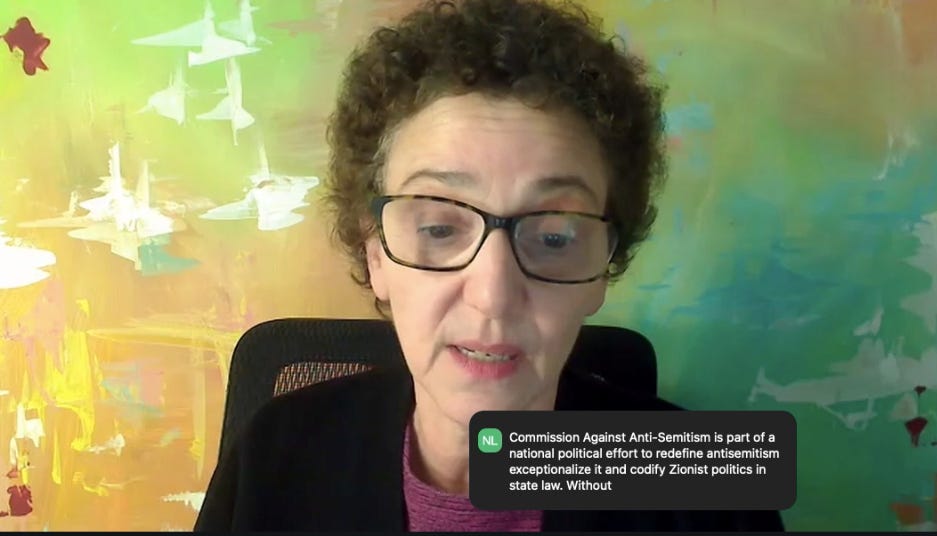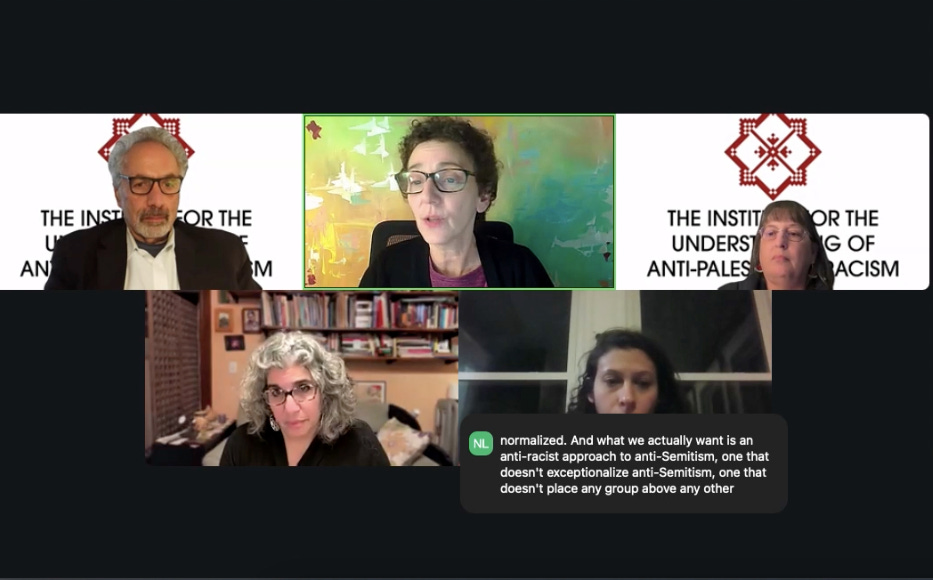Institute for the Understanding of Anti-Palestinian Racism and Massachusetts Peace Action: the Special Commission on Anti-Semitism is about "codifying Zionism" and protecting Israel - not antisemitism
with special guest State Senator Pat Jehlen
UPDATE: Activists tried to get this post removed from Substack. They were unsuccessful. Read on to find out what they didn’t want you to know -
Massachusetts Peace Action Education Fund along with Together for an Inclusive Massachusetts ( a group which includes Jewish Voice for Peace and the Council on American-Islamic Relations) held a webinar with Merrie Najimy of the Institute for the Understanding of Anti-Palestinian Racism , Dr. Jess Ghannam, Cherie Ginwalla and Nora Lester Murad, who wrote the “toolkit” on how to “defend against false accusations of anti-semitism.”
The webinar discussed Anti-Palestinian Racism and how the Massachusetts Special Commission on Combatting Anti-Semitism contributes to Anti-Palestinian Racism. For more on the actors involved in the webinar and on the commission itself, see here.
Nora Lester Murad - “Tonight we’re going to talk about how antisemitism and the distortion of antisemitism and anti-Palestinian racism are connected in Massachusetts state policy. Including what we as anti-racists can do to ensure that efforts to oppose bigotry and discrimination against Jews are done the right way in a framework of collective liberation for all and not at the expense of Palestinians.”
The webinar began with Murad discussing the Commission. She claimed that the Commission has been politicized because it was created by a budget amendment.
She said that the Commission was lobbied for by the Anti-Defamation League, the Jewish Community Relations Council, and the American Jewish Community, Combined Jewish Philanthropies and Israel-American Civic Action Network. She calls these groups the “main organizational perpetrators of anti-Palestinian Racism” who “purport to protect Jews from antisemitism but actually protect Israel…”
Murad claims concerns about the Commission are well founded because the Commission includes these groups which represent the mainstream of the Jewish community and not anti-Zionist Jews like herself who “are direct victims of these organizations false accusations of antisemitism when we stand up for Palestinian humanity and against their slaughter.”
She says the Commission is part of a nation-wide effort to “redefine antisemitism, exceptionalize it and codify Zionist politics in state law.” She claims this hurts Palestinians but also diverts attention from “real antisemitism” which comes from “right wing Christian nationalism.”
Listen to Murad’s remarks here:
After Murad, Merrie Najimy began by discussing Anti-Palestinian Racism. As with previous talks given by IUAPR, they first justify why the term “racism” is appropriate - racism is “structural” and “systematic” and groups that have been “racialized” have “changed over time” according to Najimy. She then moves to describe something called “community cultural wealth” which is meant to justify why Palestinians can be classed as a race.
We can understand Palestinians as a group, explains Najimy, through these different forms of “community cultural wealth”:
“Aspirational capital is the ability to maintain hopes and dreams for the future even in the face of real or perceived barriers and oppression.”
“Familial capital are those cultural knowledges nurtured among familia or kin that carry a sense of community, history, memory, cultural intuition.”
“Resistance capital are those knowledges and skills that are fostered through oppositional behavior that challenge inequity and systems of oppression.”
“Social capital is the network of people and community resources that are tapped into to build resilience and resistance.”
Najimy claims that “Palestinian culture” is “resistance capital” - the keffiyah is centuries old and a symbol of Palestinian resistance, says Najimy. Palestinians and non-Palestinians wear it as resistance as a sign they “refuse to accept ethnic cleansing.”
Here is Najimy discussing the Keffiyah as “resistance capital” as well as other forms of resistance against what she calls the “Israel Occupation Forces.”
Cherie Ginwalla takes over to discuss the definition of Anti-Palestinian Racism, taken from the Arab Canadian Lawyers Association, and widely discussed in this substack. She goes over the use of “passive” vs “active” language to elicit sympathy for Israelis on October 7th versus the Israeli operation in Rafah, and the use of the word children vs minors - this is similar content to the training that took place at Balboa High School.
Elements of APR include: Denying the historical fact of the Nakba, denying that Israel is a settler colonial state, justifying violence against Palestinians, and equating the actions of the “oppressed” with the “oppressor.”
However, Ginwalla tells us:
“Anti-Palestinian racism framing is not a weapon. It is an anti-oppression tool.”
Dr. Ghanam then goes over the IUAPR survey (a survey which seems to have been sent to people already predisposed to see themselves as victims of APR) - the key finding of the survey is that the majority of those who experience APR are not themselves Palestinian.
And then it was back to discussing the Commission:
Murad is concerned that addressing antisemitism will lead to APR. Instead, she calls for an “anti-racist” approach to antisemitism which won’t “exceptionalize antisemitism” or “place any group above any other group.”
Sana Fadel, member of Sawa: Newton-Area Alliance for Peace and Justice, argues that the Commission will institute a definition of antisemitism that precludes criticism of Israel (a misunderstanding of IHRA). Instead, antisemitism should be understood through a “liberation lens.”
Dr. Ghanam says: “we are trying to build an anti-racist society, an inclusive society, a collective liberation society.” He asserts that this is not a “zero sum game.”
Murad adds:
“the term or phrase “weaponizing antisemitism”, it’s kind of a complicated idea or phrase, that is maybe not understood by everyone but when accusations of antisemitism are used wrongly, false accusations, in order to silence anything pro-Palestinians - this is using antisemitism as a weapon.”
The panel nods along vigorously.
Listen to the full - Fadel discussing the commission and the “weaponization of antisemitism” here
Interestingly, Murad doesn’t think a definition of antisemitism is necessary. But clearly a definition of anti-Palestinian racism is.
The panel ends by discussing how individuals might engage with and influence the Commission, particularly through the group Together for an Inclusive Massachusetts.
Together for an Inclusive Massachusetts is planning to meet with decision-makers and is already having meetings with Commissioners and legislators.
Murad adds that :
“we have a lot of work to do because Zionism is normalized in state policy and education policy. And as we try and confront that normalization we are getting attacked and labeled and falsely accused. And that is also part of an expression of anti-Palestinian racism to say that anyone who stands up for Palestinians or who criticizes Israel or who doesn’t agree with these mainstream legacy Jewish organizations is somehow antisemitic.”
Finally, State Senator Pat Jehlen suggests that the best way to engage with a legislator is to share personal and individual stories and narratives. Jehlen shares that she is unsure of who her “friends” in the state legislature are on this issue.
Listen to the full exchange here:
People who registered for this webinar also received this email - for Congressional District 8 in Massachusetts for planning “actions” and to “make Palestinian liberation a litmus test for all candidates”:
Just for fun - a sample of some of the lovely comments in the webinar chat:





















